NewsBeat
‘Mysterious balls’ that washed up on Australian beaches contained faecal bacteria | World News

Tests on the “mysterious balls” which led to the closure of several Australian beaches last week have revealed they were made up partially of faecal bacteria.
Nine beaches in Sydney were closed by authorities on 14 January after white-grey, ball-shaped debris washed up along the shore.
The Northern Beaches Council, which described the debris as marble-sized balls, organised their safe removal before reopening the beaches to the public.
The council said in an update on Tuesday that its analysis had indicated the presence of hydrocarbons and saturated fatty acids, along with faecal coliforms and E-coli.
It also said the Environmental Protection Authority was analysing its own samples of the debris.
Officials said they would continue to monitor the beaches and urged anyone who finds more debris to avoid handling it and report it to council lifeguards.
Read more from Sky News:
Dangerous winds to hit UK
Trump pardons 6 January rioters
At least 66 dead in hotel fire
It comes after around 2,000 black balls washed ashore in Sydney in October last year, leading to seven beaches being closed.
They were initially believed to be tar balls, formed when oil comes into contact with debris and water, often as a result of oil spills or seepage.
The objects were later revealed to contain fatty acids, chemicals consistent with those found in cleaning and cosmetic products, mixed with some fuel oil.
NewsBeat
Why Thailand became a haven for LGBT couples

 Getty Images
Getty Images“It has been a long fight full of tears for us.”
That is how Ann “Waaddao” Chumaporn describes the years that led to this moment – on Thursday, when same-sex marriage becomes legal in Thailand, and more than a hundred couples will tie the knot in one of Bangkok’s biggest shopping malls, in a riot of colour and celebration.
And the same question which has been heard throughout the long campaign to get the equal marriage law passed will be asked again: why Thailand? Why nowhere else, aside from Taiwan and Nepal, in Asia?
People think they know the answer. Thailand is famously open to and accepting of lesbian, gay, bisexual and trans people. They have long been visible in all walks of life. Thai people are easy-going about pretty much everything. “Mai pen rai” – no big deal – is a national catch-phrase. Buddhist beliefs, followed by more than 90% of Thais, don’t forbid LGBT lifestyles. Surely, then, equal marriage was inevitable.
Except it wasn’t. “It was not easy,” says Ms Waaddao, who organises Bangkok Pride March.
The first Pride march in Thailand took place only 25 years ago. Back then it was hard to get approval from the police, and the march was a chaotic, unfocused event. After 2006 only two marches took place until 2022. In 2009 one planned Pride march in Chiang Mai had to be abandoned because of the threat of violence.
“We were not accepted, by our own families and by society,” Ms Waaddao adds. “There were times when we did not think marriage equality would ever happen, but we never gave up.”
‘We did not fight, we negotiated’
For all of Thailand’s general tolerance of LGBT people, getting equal rights, including marriage, required a determined campaign to change attitudes in Thai officialdom and society. And attitudes have changed.
When Chakkrit “Ink” Vadhanavira started dating his partner in 2001, they were both actors playing leading roles in TV series. At that time homosexuality was still officially described by the Thai Ministry of Health as a mental illness.
“Back then society could not accept leading male roles being played by a gay man. There was lots of gossip about us in the media, much of it untrue, which really stressed us,” Mr Chakkrit recalls.
“We decided then that if we were going to date each other, we had to leave showbiz.”
They are still together but they have stayed out of the limelight for more than 20 years, running a successful production company.
A lot has changed in that time – and their industry gets some credit for that.
The way LGBT characters are portrayed in Thai TV dramas, from comical oddities to mainstream roles, made a big difference, according to Tinnaphop Sinsomboonthong, an assistant professor at Thammasat University who self-identifies as queer.
“Nowadays they represent us as normal characters, like you see in real life,” he says. “The kind of LGBTQ+ colleague you might have in the office, or your LGBTQ+ neighbour. This really helped change perceptions and values in all generations.”
The so-called Boy Love dramas have helped bring the rest of society round to the idea of not just tolerance, but full acceptance and equal rights for the community.
 Getty Images
Getty ImagesThese romantic television dramas featuring love affairs between beautiful young men have grown enormously in popularity over the past decade, especially during the Covid pandemic.
They are now one of Thailand’s most successful cultural exports, with huge audiences in places like China. Series like My School President and Love Sick have got hundreds of millions of views on streaming networks.
At the same time, activists became more focused and united in their bid to get the law changed. The many different LGBT groups came together in the Change 1448 campaign – 1448 is the clause in the Thai Civil Code covering the definition of marriage – and later under the Rainbow Coalition for Marriage Equality.
They linked up with other groups fighting for greater rights and freedoms in Thailand, and they learned to work with political parties in parliament to persuade them to change their stance on the law.
The resumption of Pride marches in 2022, and getting the government to recognise and promote the appeal of Thailand as an attractive destination for LGBT travellers also helped change public perceptions.
“We did not fight, we negotiated,” Mr Tinnaphop says. “We knew we had to talk to Thai society, and little by little, we shifted attitudes.”
The right political moment
Getting the equal marriage law through parliament was also helped by political developments in Thailand.
For five years following a coup in 2014, the country was ruled by a conservative military government, which was willing only to consider recognising civil partnerships for LGBT couples, without full rights like inheritance.
But in the 2019 election which returned Thailand to civilian rule, a new, youthful reformist party called Future Forward, which fully supported equal marriage, did unexpectedly well. They won the third-largest share of seats, revealing a growing hunger for change in Thailand.
 Getty Images
Getty ImagesWhen a year later Future Forward was dissolved by a controversial court verdict, it set off months of student-led protests calling for sweeping reforms, including curbs to the monarchy’s power.
LGBT campaigners were prominent in those protests, giving them greater national prominence. The protests eventually died down, with many of the leaders arrested for questioning the monarchy’s role.
But in the 2023 election the successor to Future Forward, calling itself Move Forward, performed even better than in 2019, winning more seats than any other party. Again, it was clear that the desire for change was felt across Thai people of all ages.
Move Forward was blocked from forming a government by conservatives who objected to its call for wholesale political reforms.
But by this time, equal marriage was less contentious. Few opposed it. And passing it gave the unwieldy and unpopular coalition government which had been formed without Move Forward a quick accomplishment with which to please most of the country.
Pioneering move may boost tourism
Thailand, though, is an outlier in Asia. Few other countries in the region are likely to follow suit.
The influence of Islam in Malaysia, Indonesia and Brunei makes the notion of equal marriage a non-starter. LGBT communities there face discrimination and prosecution; in Brunei sex between men carries the death penalty.
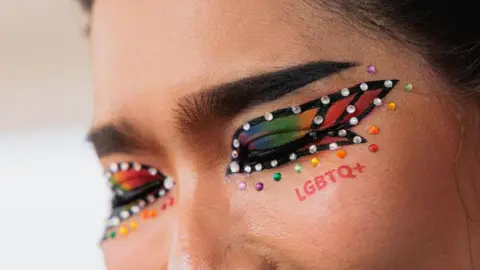 Getty Images
Getty ImagesIn the Philippines, there is growing acceptance of LGBT couples living together openly. But the Roman Catholic Church vehemently opposes same-sex marriage.
In Vietnam, like Thailand, there are no religious or ideological obstacles, but campaigning to change the law, as happened in Thailand, is difficult under a repressive regime. Much the same is true in China. Until the ruling communist party endorses equal marriage, which it shows no signs of doing, it cannot happen.
Even in democracies like Japan and South Korea – where political parties are largely conservative and dominated by older men – the prospects look bleak.
“It is largely conservative Christians who are blocking it,” says Chae-yoon Han, executive director of the Beyond the Rainbow Foundation in South Korea.
“Most, if not all, politicians in the conservative party of President Yoon are devout Christians, and they have framed marriage equality as a ‘leftist agenda’, which could potentially open society to a ‘leftist, communist takeover’.”
India appeared close to legalising same-sex marriage in 2023, when the decision fell to its Supreme Court – but the judges declined, saying it was up to parliament.
So Thailand hopes to benefit from being a pioneer. Tourism is one of the few areas of the Thai economy doing well in the post-pandemic recovery, and the country is seen as a safe and welcoming destination for LGBT holiday-makers.
Growing numbers of same-sex couples from other Asian countries are choosing to live here now.
The legal recognition they can get for their marriages will allow them to raise children and grow old together with nearly all the rights and protections given to heterosexual couples.
NewsBeat
Bank account snooping and driving bans planned in government crackdown on benefit fraudsters | Politics News
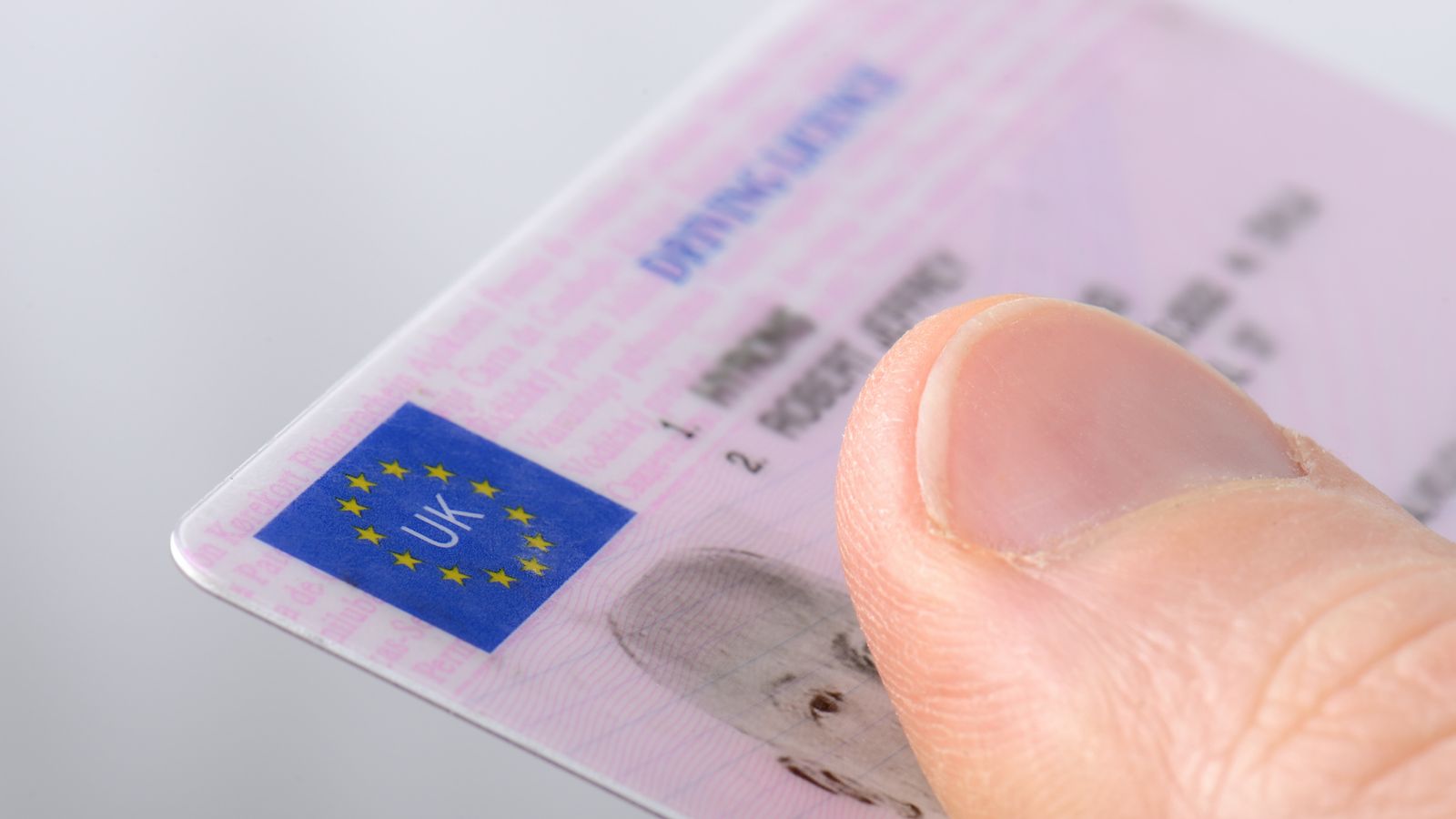
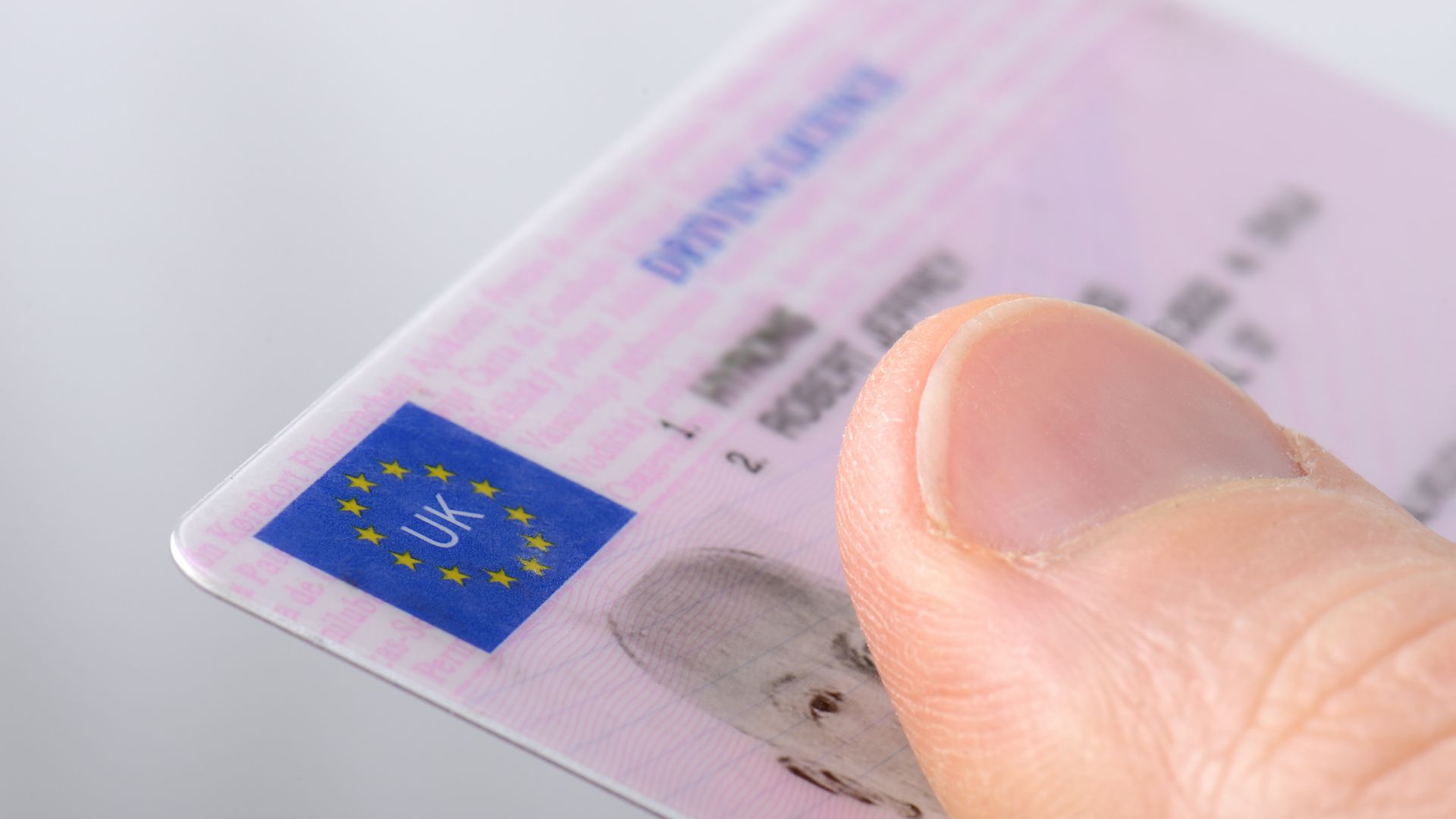
Benefit fraudsters could be banned from driving and subject to bank account snooping if they fail to pay back the taxpayer, under a new government crackdown.
In an effort to curb welfare fraud, the Department of Work and Pensions (DWP) has launched what has been dubbed the biggest fraud crackdown in a generation.
The Public Authorities (Fraud, Error and Recovery) Bill would introduce new measures, including allowing the government to recover money directly from fraudsters’ bank accounts.
It is due to be introduced to parliament on Wednesday and the DWP estimates it could help save the taxpayer £1.5bn over the next five years.
According to government figures, around £8.6bn was lost to fraud and error overpayments in the financial year ending in April 2024.
Gang member convicted of ‘industrial scale’ £50m benefit fraud
Once the bill is made law, benefit cheats could be banned from driving for up to two years if they refuse to pay back the money they owe.
Courts could also suspend their driving licences following an application if they have debts of £1,000 or more and repayment requests are ignored.
The DWP will also have the power to get bank statements from people who it believes have enough cash to pay back the debts but are refusing to do so.
“We are turning off the tap to criminals who cheat the system and steal law-abiding taxpayers’ money,” Work and Pensions Secretary Liz Kendall said.
Read more from Sky News:
Southport attack a sign ‘country faces new threat’
Dangerous winds to hit UK this week
Village blocked in by 80ft mound of rubbish
She added: “This means greater consequences for fraudsters who cheat and evade the system, including as a last resort in the most serious cases removing their driving licence.
“Backed up by new and important safeguards including reporting mechanisms and independent oversight to ensure the powers are used proportionately and safely.
“People need to have confidence the government is opening all available doors to tackle fraud and eliminate waste, as we continue the most ambitious programme for government in a generation – with a laser-like focus on outcomes which will make the biggest difference to their lives as part of our Plan for Change.”
There was a significant spike in fraud and error-related benefit overpayments during the COVID pandemic.
Rates nearly doubled from the financial year ending April 2021 to their peak in 2023 at around 4% of the total amount of benefit paid by the department.
The incoming bill will grant more powers to tackle this COVID-era fraud.
Helen Whately, the shadow work and pensions secretary, claimed the laws were a “continuation” of Conservative efforts.
She added: “But having knowingly appointed a convicted fraudster to his cabinet, Keir Starmer cannot be trusted to get tough on fraud.”
Ms Whately was referring to former transport secretary Louise Haigh, who was forced to resign from the cabinet after it was revealed that in 2013 she had lied to police over a work phone she had said was stolen in a mugging.
NewsBeat
Thousands on hold to HMRC cut off after 70 minutes, report finds

 Getty Images
Getty ImagesHMRC has denied running a “deliberately poor” phone service in an attempt to push taxpayers to seek help online instead.
Nearly 44,000 customers were cut off without warning after being on hold for more than an hour last year, a report by a committee of MPs found.
It warned HMRC’s service had got even worse since then and urged the tax authority to take responsibility for failing its customers.
HMRC chief executive Jim Harra said the committee’s claims on its customer service were “completely baseless” and added “we’ve made huge improvements to our service standards, with call wait times down by 17 minutes since April last year”.
The report comes ahead of the deadline for self-assessment tax returns on 31 January, which could lead to increased demand for help.
HMRC’s phone line went dead on 43,690 customers who had been waiting 70 minutes to reach an adviser in the first 11 months of 2023-24, the Public Accounts Committee (PAC) report said.
This was because HMRC’s system could not cope with the volume of calls but customers were not warned they were about to be cut off, nor were they called back, the report added.
The figure for the number of callers cut off was published by the National Audit Office (NAO) in May last year but MPs have highlighted it among fears HMRC was running down its own helpline.
Sir Geoffrey Clifton-Brown MP, chair of the PAC, said HMRC was “excavating its way to new lows” in its customer service every year.
He added: “Worse, it seems to be degrading its own services as a matter of policy.”
‘Uncollectable debts’
The committee has called for “bold and ambitious leadership” to improve its customer services, and better tackle tax system abuse and unpaid debts.
In 2023-24, HMRC wrote off £5bn in debts as uncollectable, up from £3.2bn in 2022-23.
The report called for the authority to get a better understanding of the offshore tax gap – the difference how much tax should be paid, and what was actually paid.
It also raised concerns over decreasing rates of criminal investigation and prosecution for tax-related offences.
The recommendations come after a series of criticisms levelled at HMRC.
In March last year, it announced its phone line would be closed between April and September, but was forced to reverse its decision within 24 hours.
And in May a report found that customers were waiting an average of nearly 23 minutes to get through to an adviser.
Mr Harra, first permanent secretary and chief executive at HMRC, said: “We will always be there to answer the phone for those who need extra help. At the same time, more than 80 per cent of customers are satisfied with our digital services, with more and more people using them to quickly and easily manage their tax affairs.”
NewsBeat
‘Every day I try to cry a little bit’

 Sarah Louise Bennett / BBC
Sarah Louise Bennett / BBCWhen Teddy Swims turned up to the MTV Awards last September, he was nominated for four prizes, including best new artist.
In the event, the combined forces of Chappell Roan and Sabrina Carpenter denied him a single Moon Man trophy – but the singer left with something much more valuable.
“I didn’t realise until a couple of weeks later, but my partner and I conceived that night,” he beams.
“We’re due in June and things are great. I think we’re gonna crush it.”
Domestic bliss isn’t a quality that fans might associate with Teddy Swims.
His huge breakthrough single Lose Control, and the hit album I’ve Tried Everything But Therapy, were rooted in dysfunction, addiction and heartbreak.
They were inspired by a toxic, mutually-destructive relationship he’d escaped. In the past, he’s described it as a “really co-dependent lifestyle” that went from “bender to bender” as both sides “leveraged each other’s shame against one another”.
As he sings on a recent single, “I saved my life when I showed you the door”.
But that was only one chapter in the story of the 32-year-old Georgia native Jaten Dimsdale.
This Friday, he releases a second album, I’ve Tried Everything But Therapy Part 2, that explains what happened next.
“I’ve learned that love doesn’t have to be this thing of high highs and low lows – fighting and pulling teeth just to stay together,” he says.
“The first album was a lot of turmoil, and not too much closure. So I wanted to come back and say, ‘Here’s me on the other side of this, and I’m doing better’.
“I feel like, as a listener, I would want to hear that there’s a way out.”
 Getty Images
Getty ImagesHis new partner is also a singer-songwriter, Raiche Wright, who he met “a couple of Thanksgivings ago” when she came to one of his shows – and the new album dwells in a sort of bewildered bliss.
“Are you something from a dream or something that I made up?” he wonders on the slick R&B groove of Are You Real.
Later, on the acoustic guitar ballad If You Ever Change Your Mind, he croons, “I love you, I love you,” with a quiet sincerity rarely found in a pop record.
Musically, the album paints from the same palette as before – a brand of 1960s soul where dusty piano grooves and chugging guitar lines are punched up with a modern pop sheen, and a pinch of rock and roll swagger.
But it’s not all hearts and flowers. The sumptuous soul of Black And White makes a plea for tolerance, inspired by the prejudice Dimsdale and his partner – who has mixed black and white heritage – have faced.
“I see people looking disgusted because we’re different colours – especially down South,” he says.
“But it’s okay to be happy in love with someone of a different colour, or a different size or shape, or the same sex, or whatever it is.
“Why would you be hating on that? It’s such a backwards thing.”
 Claire Marie Vogel
Claire Marie VogelDimsdale learned about acceptance the hard way. Born in Conyers, an eastern suburb of Atlanta, his grandfather was a Pentecostal preacher with set views on the world, and family life was hard to navigate.
His parents divorced when he was three and, although both remarried, their new relationships were problematic. His mother, with whom he lived, married an alcoholic who left suddenly when Dinsdale was 18 and never spoke to the family again.
His father, who he saw at weekends, married a woman who developed serious mental health problems, including schizophrenia, and spent long stretches in hospital. His dad ended up raising Dimsdale’s step-brothers almost single-handedly.
“He’d work 18 hours a day, and still get the homework done and still get to the practices, all by himself,” he says.
“There’s just not enough I can say about how amazing that man truly is.”
Dimsdale was a late bloomer when it came to music. As a youngster, he was a dedicated footballer, until a friend convinced him to audition for a school production of Damn Yankees.
The musical sparked a love affair with singing. He researched vocal techniques on YouTube, soaking in performances by Stevie Wonder, Michael Jackson and Aretha Franklin.
After graduation, he started playing with local metal bands, adopting the stage name “Swims” from internet forum-speak for Someone Who Isn’t Me Sometimes. Teddy, meanwhile, is a childhood nickname, based on his affable and cuddly persona.
Old-fashioned success
But it was a cover of Shania Twain’s country ballad You’re Still The One that earned him his big break.
On YouTube, it’s been watched 197 million times. One of those viewers was a talent scout for Warner Bros records, who signed Dimsdale to a record deal on Christmas Eve 2019.
They partnered the musician with professional writers like Julian Bunetta (Sabrina Carpenter, One Direction) and Mikky Ekko (Rihanna, Drake) – but he also retained his high school band, Freak Feely, who play with him to this day.
After three EPs, and hundreds of sessions, they wrote Lose Control, and Dinsdale instantly “knew it was going to change my life”.
He was right. With 2.2 billion global streams, it is one of the most successful songs in recent chart history – but finding an audience took time.
There was no viral moment or TikTok trend associated with Lose Control. Instead, Dimsdale “did it the old-fashioned way”.
“We showed up and did every damn interview possible,” he says. “We went to every office and radio station and shook every hand individually. We stopped everyone on the street, busking.”
He believes the personal touch beats everything, hands down.
“People love to see their friend win, so if you go out there and make time for them, it goes a lot further than a playlist coming across your desk, or a little file coming to your email that says, ‘Hey, can you push this song?’
“And that’s the old way you work a record, before streaming.”
 Chapman Bailer
Chapman BailerBashfully, he confesses the song made him a millionaire (“so I can’t be too mad at that girl any more, can I?”) but he’s learning that making money means spending money.
“A million dollars goes so fast,” he says. “Once you put 66 people on a tour, with all the gear and all the lights, it’s right out the door as fast as you get it.
“Twenty bucks still means what 20 bucks meant to me before, but the amount coming in and out is such a scary thing to look at sometimes.”
As we speak, he’s in rehearsals in Pennsylvania, ahead of his first European arena tour, which includes two nights at Wembley this March.
The stage has just been built for the first time, and he’s eager to acquaint himself with all the ramps and video walls. The music… not so much.
“I wouldn’t say I’m already sick of the songs, but we’ve been playing them non-stop for two weeks now,” he says. “I can’t wait ’til people sing along, so I can fall in love with them again.”
If you’ve been to a Teddy Swims show, you’ll know he lays his heart on the line.
There are countless videos of him sobbing as he performs Some Things I’ll Never Know, a song about abandonment and grief. For the upcoming tour, he’s playing it back-to-back with a new tear-jerker, Northern Lights, that dives even deeper into heartbreak.
He’s going to be a mess – but Dimsdale insists it’s a good thing.
“Every day I try to cry a little bit,” he says. “It’s just pain leaving the body.
“And it’s a constant reminder that, whatever you were going through, on the other side of it there’s happiness.”
With his bearded and tattooed face, you might not expect such emotional intelligence – but Dimsdale’s model of masculinity wasn’t afraid to share his feelings.
“I’m my daddy’s son,” he says. “He’s just a sensitive man. He’ll tell you he loves you, he’ll tell you he’s proud of you. Man, I’ll still sit there, laying in his arms while we’re watching TV on the couch.”
“He’s the most beautiful, humble human being I’ve ever met. Second to only Jesus Christ.”
So, the obvious question: Is dad excited to become a grandfather?
“He’s doing backflips,” laughs the singer.
“I’m almost scared to have him as a granddad, because I want my kids to think I’m cool, too.”
NewsBeat
Dangerous drug-resistant bacteria are spreading in Ukraine
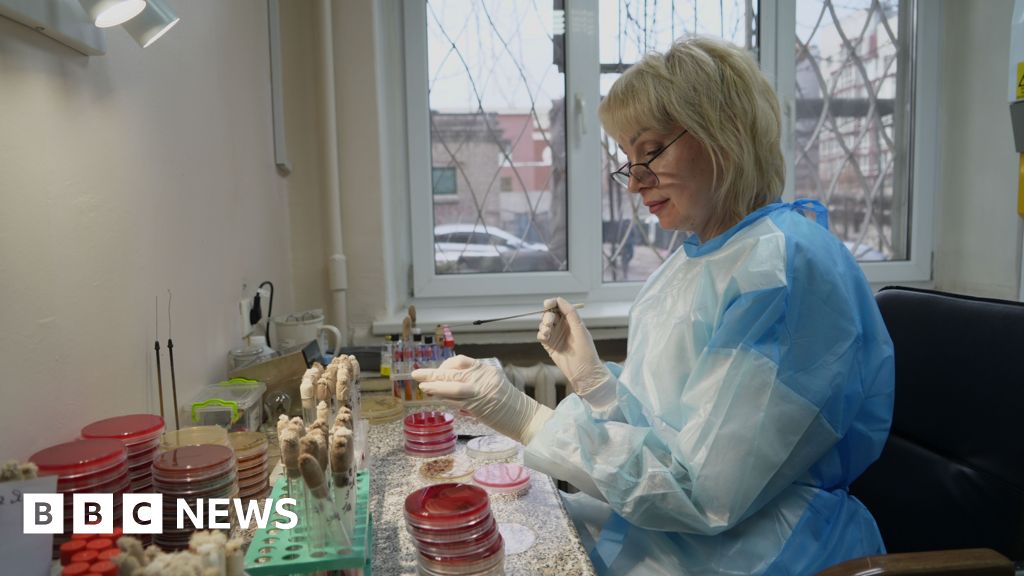
 BBC
BBCWhen Pte Oleksander Bezverkhny was evacuated to the Feofaniya Hospital in Kyiv, few believed he would live. The 27-year-old had a severe abdominal injury and shrapnel had ripped through his buttocks. Both his legs were amputated.
Then, doctors discovered that his infections were resistant to commonly-used antibiotics – and the already daunting task of saving his life became almost hopeless.
Antimicrobial resistance (AMR) is when bacteria evolve and learn how to defend themselves against antibiotics and other medicines, rendering them ineffective.
Ukraine is far from the only country affected by this issue: around 1.4 million people globally died of a AMR infection in 2021, and in the UK there were 66,730 serious antibiotic-resistant infections in 2023. However, war appears to have accelerated the spread of multi-resistant pathogens in Ukraine.
Clinics treating war injuries have registered a sharp increase of AMR cases. More than 80% of all patients admitted to Feofaniya Hospital have infections caused by microbes which are resistant to antibiotics, according to deputy chief physician Dr Andriy Strokan.
Ironically, antimicrobial-resistant infections often originate from medical facilities.
Medical staff try to follow strict hygiene protocols and use protective equipment to minimise the spread of these infections but facilities can be overwhelmed with people injured in the war.
Dr Volodymyr Dubyna, the head of the Mechnikov Hospital’s ICU, said that since the start of the Russian invasion his unit alone has increased the number of beds from 16 to 50. Meanwhile, with many employees fleeing the war or joining the military themselves, staffing levels are down.
Dr Strokan explained that these circumstances can affect the spread of AMR bacteria. “In surgical departments there is one nurse that looks after 15-20 patients,” he said. “She physically cannot scrub up her hands in the required amount and frequency in order not to spread infections.”

The nature of this war also means patients are exposed to far more strains of infection than they would be in peacetime. When a soldier is evacuated for medical reasons, they will often pass through multiple facilities, each with their own strains of AMR. While medical professionals say this is unavoidable because of the scale of the war, it only worsens the spread of AMR infections.
This was the case for Pte Bezverkhny who was treated at three different facilities before reaching the hospital in Kyiv. Since his infections could not be treated with the usual medication, his condition deteriorated and he contracted sepsis five times.
This situation is different to other recent conflicts, for example the Afghanistan War, where Western soldiers would be stabilised on site and then air-transferred to a European clinic rather than passing through multiple different local facilities.

This would not be possible in Ukraine as the influx of patients has not been seen since the Second World War, according to Dr Dubyna, whose hospital in Dnipro neighbours front-line regions. Once his patients are stable enough, they are transferred to another clinic – if it has room – to free up capacity.
“In terms of microbiological control, it means they spread [bacteria] further. But if it’s not done, we’re not able to work. Then it’s a catastrophe.”
With so many wounded, Ukrainian hospitals simply cannot usually afford to isolate infected patients – meaning that multi-resistant and dangerous bacteria spread unchecked.
The problem is that infections they cause must be treated with special antibiotics from the “reserve” list. But the more often doctors prescribe these, the quicker bacteria adapt, making those antibiotics ineffective too.
“We have to balance our scales,” Dr Strokan explains. “On the one hand, we must save a patient. On the other – we mustn’t breed new microorganisms that will have antimicrobial resistance.”

In Pte Bezverkhny’s case, doctors had to use very expensive antibiotics, which volunteers sourced from abroad. After a year in hospital and over 100 operations, his condition is no longer life-threatening.
Doctors managed to save his life. But as pathogens grow more resistant, the struggle to save others only gets harder.
NewsBeat
PM’s terror law overhaul and Trump widens ‘economic war’







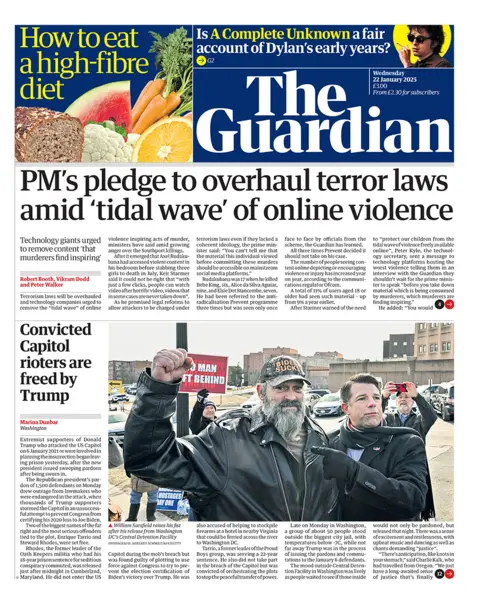






NewsBeat
Children’s happiness at risk due to decline in reading for pleasure
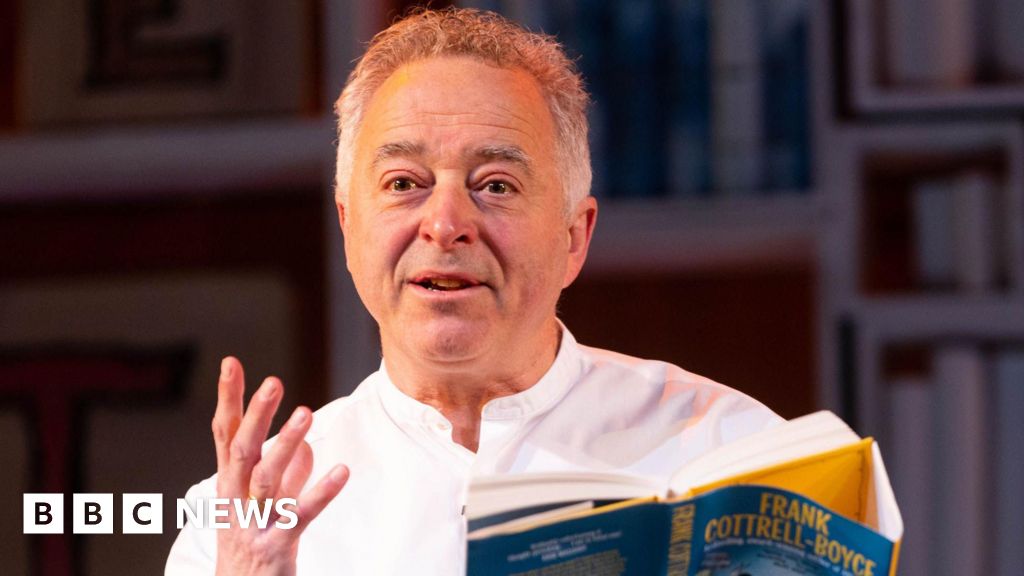
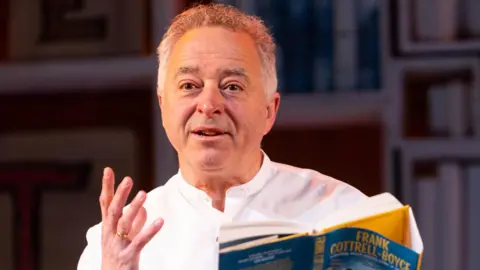 PA Media
PA MediaBest-selling author Frank Cottrell-Boyce, the current children’s laureate, is to spearhead a campaign to tackle a “recession in children’s happiness” that he believes is caused by a decline in reading at a young age.
The writer has organised a summit in Liverpool on Wednesday, at which he will call on the government to “stand up and give a visible sign this country values its children”.
Cottrell-Boyce, whose books include Millions and Cosmic, will warn that while children in the UK may fare well in reading league tables, reading for pleasure is in decline, leading to “less chance of [them] being happy”.
The Reading Rights Summit will also hear from fellow authors Cressida Cowell and Michael Rosen, two of his predecessors as children’s laureate.
Cottrell-Boyce will implore politicians “to make sure that every single child has access to books, reading and the transformative ways in which they improve long-term life chances”.
The author will add that “our children are near the top of the global leagues when it comes to the mechanical skill of reading but near the bottom when it comes to ‘reading for pleasure.’
“That our children seem to be experiencing some kind of happiness recession at the moment is not surprising, and I believe that the decline in reading has played its part in this.”
Speaking to the BBC ahead of his speech, the writer emphasised the benefits of help with reading in early years. “It’s easy to get depressed about the situation, but there’s a huge amount of happiness and optimism to be drawn on,” he said.
 Getty Images
Getty ImagesA 2022 BookTrust survey of over 2,000 low-income families in England, Wales and Northern Ireland found less than half of children under seven are being read a bedtime story.
Disadvantaged children who achieve highly at the end of primary school are twice as likely to have been read to at home in their early years compared with their peers, the charity found.
Cottrell-Boyce described the “invisible privilege” of being read to from a young age as “not something that people have seen the importance of, and if you have it, then you’re at a huge advantage over other people”.
Screen time is also an issue. In his speech, he will say he has heard about some children who “instead of turning the pages, try to swipe them or make the pictures grow bigger with their fingers” because they hadn’t encountered a book before starting school.
He will also say: “Yes, it’s important for educational attainment. Yes, DCMS (Department for Culture, Media and Sport), it’s the most crucial – and most democratic – part of our cultural heritage.
“Shared reading is an effective, economic health intervention, so yes, it’s essential, [Health Secretary] Wes Streeting, to mental health, to bonding, to attachment, to creating a situation where parents and carers can give the best, the most joyous start in life to our children.”
 Getty Images
Getty ImagesHe told the BBC he had “incredibly happy memories” of his own childhood.
But in hindsight, he realised his mum was finding life difficult living in a small flat with her own mother and two young boys.
“Her solution was, she took us to the library a lot. I don’t think she was hoping to hothouse us. I think she just wanted to get out and have somewhere nice to sit!
“I’ve just got these unbelievably happy memories… so that’s what makes me passionate about happiness.”
Many children’s laureates have campaigned on similar issues, but Cottrell-Boyce told the BBC he was aiming his message more at the government than the public.
He added: “We’re not talking about a huge undertaking. Some of the most amazing stuff I’ve seen, in terms of capital spend, has been some Pritt stick and two copies of [Rod Campbell’s classic toddler book] Dear Zoo.
“The infrastructure is there but it’s not joined up.”
The summit, organised with children’s reading charity BookTrust, will also hear from Rachel de Souza, the government’s children’s commissioner, and a report will be issued afterwards.
A Department for Education spokesperson said: “High and rising standards, with excellent foundations in reading, writing and maths and making sure tens of thousands more children start school ready to learn are key parts of our Plan for Change to ensure every child can achieve and thrive.
“We’ve invested over £90 million in our English Hubs programme, which supports reading for pleasure, with a further £23 million committed for the 2024-25 academic year and we have extended early language support.”
NewsBeat
Donald Trump considers 10% tariff on China from February

US President Donald Trump has said he is considering imposing a 10% tariff on imports of Chinese-made goods as soon as 1 February.
Trump said discussions with his administration were “based on the fact that they’re sending fentanyl to Mexico and Canada.”
It followed threats by Trump to levy import taxes of 25% on Mexico and Canada, accusing them of allowing undocumented migrants and drugs to come into the US.
On his first day in office, the new president also instructed federal agencies to conduct a review of existing trade deals and identify unfair practices by US trading partners.
NewsBeat
MPs say woefully inadequate eating-disorder care is costing lives

 BBC
BBCLives are being lost and families torn apart because of “woefully inadequate care” for people with eating disorders, according to a group of MPs.
The “alarming” rise in disorders such as anorexia and bulimia, over the past decade, has now become an “emergency”, the All-Party Parliamentary Group on Eating Disorders says in a report.
And greater awareness about different types of eating disorders and how they affect males and females of all ages and ethnicities is urgently needed.
NHS England acknowledged services were under extreme pressure but said all mental-health trusts now offered teenagers and young people early help.
‘Eating nothing’
At 13, Olimata Taal responded to issues at home by denying herself food and over-exercising.
It was the only thing she felt she could control.
“Eating healthier quickly became eating less, to eating nothing,” Olimata says.
“I remember literally feeling like a shell of a human.
“I remember having to take multiple baths a day, because my body literally couldn’t keep itself warm.”
Some teachers suspected something was wrong but failed to intervene.
And when Olimata first saw a GP, she was told to just “eat a muffin”.
‘Survivor’s guilt’
Now 27, Olimata says her mixed Gambian and English heritage added another layer of complexity to her experience.
“A huge part of African culture, in my experience, is about being strong, being strong-minded,” she says.
“I didn’t see anyone who looked like me going through an eating disorder.”
After she was diagnosed with anorexia, Olimata went on to receive consistent support from Child and Adolescent Mental Health Services (Camhs), which “saved her life”, although she still feels “survivor’s guilt”.
But because she did not want to lose that support, sometimes she felt no incentive to get better.
‘Grossly’ underfunded
The MPs spent six months listening to “harrowing” experiences from patients, bereaved families, clinicians and academics.
Eating disorders are often misunderstood and seen as a lifestyle choice affecting only white teenage girls, the report says.
In reality, they are serious but treatable mental illnesses.
The report refers to figures showing a growing number of people affected:
The report says services are “grossly” underfunded, there are barriers to accessing treatment and wide variations in care quality across the UK.
It calls for:
- a national strategy to properly support adults, young people, families and healthcare staff
- mandatory training so front-line workers such as teachers and nurses can spot different illnesses and offer help
“That’s a very good idea,” consultant child-and-adolescent psychiatrist Dr Vic Chapman, who works for an eating-disorders service run by London’s Royal Free Hospital, says.
“There is a big treatment gap for eating disorders.”

Mollie Campbell, 17, and her family fought for six years for a diagnosis of avoidant/restrictive food intake disorder (ARFID), where an individual avoids specific types of food.
Dismissed as a fussy eater, she was repeatedly refused help from eating-disorder services because she did not match the criteria for those more widely understood.
“I thought the only way to get help was to eat even less, lose more weight and get sicker,” Mollie says.
Without specialist help, her desperate family regularly took Mollie to accident and emergency, with stabbing chest pains, which doctors said could be caused by her eating habits.
“I was in such a dark place where I saw no way out,” Mollie says.
But now, armed with more information on her condition, she is feeling positive and ready to start a new chapter, at university, in September.
‘Beyond broken’
One of the MPs, Labour’s Richard Quigley, has been through the “nightmare” of watching his own child battle an eating disorder.
“To watch someone who is bright and funny and clever just look lost and scared because there’s no treatment coming – you feel like you’re letting your child down,” he says.
As part of its long-term plans, NHS England says it has invested additional funding to improve waiting times for eating-disorder services and more than £1bn a year goes into the provision of community mental-health care for adults.
But Mr Quigley says services are “beyond broken”, far more investment is needed, which would save the NHS money in the long term, and specific training should be rolled out for GPs, dentists and carers.
“We’re not just talking about a half day of training here,” he says.
“We’re talking about days over a year to fully understand the nuances of, not just eating disorders, but the different types of eating disorders.”
Early interventions
NHS England mental-health director Claire Murdoch said there was “no doubt” eating-disorder services were “under extreme pressure” but more than four out of every five children and young people who needed urgent treatment started it within one week.
“More work needs to be done, which is why every mental-health trust now offers evidence-based early interventions for 16–25-year-olds with an eating disorder,” she said.
The report also warns about the dangers of some clinics discharging patients when their body-mass index (BMI) is very low – less than 15 – indicating a severe eating disorder.
Campaigner Hope Virgo worries some people with long-term and complex eating disorders are being viewed as “untreatable” and “being sent home to die”.
However, some experts say there may be occasions where such patients could be discharged, as long as an appropriate level of intensive community or day-patient care is available.
NewsBeat
Drug dealer forces police officer to cycle in circles | News


A police officer cycled in circles as they chased a drug dealer on his own bicycle through Greenwich, London, newly-released footage shows.
A video from 2023 published by the Metropolitan Police on Tuesday, 21 January, showed an officer pursuing Justice Oyedokun, 22.
While fleeing he left his bike behind, so Sergeant Alan Cooley got on it and pursued him.
The officer was forced to ride around a vehicle in circles to chase Oyedokun.
Oyedokun, also from Greenwich, was sentenced to eight months on 20 January 2025 after pleading guilty to possession with intent to supply a Class B drug.
-

 Fashion8 years ago
Fashion8 years agoThese ’90s fashion trends are making a comeback in 2025
-

 Entertainment8 years ago
Entertainment8 years agoThe Season 9 ‘ Game of Thrones’ is here.
-

 Fashion8 years ago
Fashion8 years ago9 spring/summer 2025 fashion trends to know for next season
-

 Entertainment8 years ago
Entertainment8 years agoThe old and New Edition cast comes together to perform You’re Not My Kind of Girl.
-

 Sports8 years ago
Sports8 years agoEthical Hacker: “I’ll Show You Why Google Has Just Shut Down Their Quantum Chip”
-
Business8 years ago
Uber and Lyft are finally available in all of New York State
-
Entertainment8 years ago
Disney’s live-action Aladdin finally finds its stars
-
Sports8 years ago
Steph Curry finally got the contract he deserves from the Warriors
-
Entertainment8 years ago
Mod turns ‘Counter-Strike’ into a ‘Tekken’ clone with fighting chickens
-
Fashion8 years ago
Your comprehensive guide to this fall’s biggest trends






You must be logged in to post a comment Login